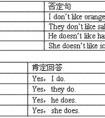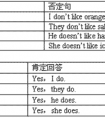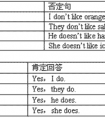用所给动词的适当形式填空。1. It's twelve o'clock now. The students_____ (have) their lunch. They _____(have) rice, meat and vegetables for their lunch. 2.-七年级英语
Some water is in the glass
(2) 单个的可数名词做主语:
The girl is Chinese. My watch is on the dresser.
(3) He ,she , it 等代词单个做主语:
He is in the tree. She likes her family very much.
(4) 单个的人名,地名或称呼作主语:
Mary is a doctor. Uncle Li speaks a little English.
Changchun is a beautiful city.
(5) 指示代词this, that 等作主语:
This is a pear. That is an apple .
(6) Everyone, everything ,something, nobody, nothing.等不定代词作主语时
Is everyone here today? Everything is ok .
(7)单个数字作主语时:
”8” is a good number in China.
动词单数第三人称形式的一般现在时的句子的否定句、疑问句及特殊疑问句。 <?xml:namespace prefix = "o" ns = "urn:schemas-microsoft-com:office:office" />
否定句:
在主语的后面实义动词前加doesn’t(注意实义动词应恢复原形。)
主语(单三)+doesn’ + 动词原形+其他
Jim likes football变否定: Jim doesn’t like football
He has lunch at school. 变否定:He doesn’t have lunch at school.
一般疑问句及答语,在句子前面加助动词does. 实义动词恢复原形
Does +主语(单三)+ 动词原形+其他
Does your father work ? Yes, he does. /No, he doesn’t
特殊疑问句:特殊疑问词+一般疑问句
特殊疑问词+ does +主语(单三)+ 动词原形+其他
Where does a bird live ?
How does she go to school?
考点名称:实义动词
- 实意动词:
即行为动词,表示动作的动词。实义动词与系动词是相对的,能独立用作谓语。
它分为及物动词和不及物动词两种:
及物动词是指后面要求有直接宾语的动词;
不及物动词指后面不需要跟宾语的动词。 实意动词使用方法:
及物动词
后面必须跟宾语意义才完整的实义动词,叫做及物动词(transitive verb)。如:
I believe that the committee will consider our suggestion.我相信委员会将会考虑我们的建议。
“How long can I keep the book ?”Harry asked.哈里问:“这本书我可以借多久?”
Dr. Bethune set us a good example. 白求恩大夫给我们树立了好榜样。
Crude oil contains many useful substances.原油含有许多有用的物质。
不及物动词
本身意义完整后面不须跟宾语的实义动词,叫做不及物动词(intransitive verb)。如:
Birds fly.鸟会飞。
It happened in June 1932.这件事发生于一九三二年六月。
My watch stopped.我的表停了。
She spoke at the meeting yesterday evening. 她在昨天晚上的会上发了言。
兼作及物动词和不及物动词
英语里有不少实义动词可以兼作及物动词和不及物动词。这样的动词又有两种不同的情况
a)兼作及物动词和不及物动词时,意义不变。试比较:
Shall I begin at once?我可以立刻开始吗?(begin作不及物动词)
She began working as a librarian after she left school.她毕业后当图书馆管理员。(began作及物动词)
When did they leave Chicago?他们是什么时候离开芝加哥的?(leave 作及物动词)
They left last week. 他们是上周离开的。(left 作不及物动词)
b)兼作及物动词和不及物动词时,有时意义不尽相同。如:
Wash your hands before meals.饭前要洗手。
Does this cloth wash well? 这布经得起洗吗?- 英汉实意动词用法比较:
与汉语的比较,有时英语动词的及物和不及物的用法,与汉语的用法不一样,请注意下列两种情况:
a)有的动词在英语里只能用作不及物动词,而汉语则可用作及物动词,如arrive到达,agree同意,listen听。英语里这些动词后面常接介词。如:
We arrived at the railway station at noon.
我们于中午到达火车站。(at不能省去)
(比较:We reached the railway station at noon.)
Everybody listened to the lecture with great interest.
每个人都很有兴趣地听讲课。(to不可省去)
(比较:We all heard the lecture.)
Do they agree to the plan?他们同意这个计划吗?(to不可省去)
b)有的动词在英语里能用作及物动词,而在汉语里则不能用作及物动词,如serve为…服务。
Our children are taught to serve the people wholeheartedly.
我们的儿童被教以全心全意为人民服务
用于be动词之后,实义动词之前。 实意动词的用法:
肯定句:
主语+动词过去式+其它
否定句:
主语+助动词didn‘t+动词原型+其他
一般过去式:
Did+主语+动词原型+其他
考点名称:不定式
- 动词不定式:
指由to加上动词原形(而且只能是动词原形)所构成的一种非限定性动词,但在有些情况下to可以省略。
动词不定式在语法功能上可作主语、宾语、宾语补足语、表语、定语和状语。 - 动词不定式可以作以上各种成分,但它毕竟是动词,所以有动词的属性。
动词不定式及其短语还可以有自己的宾语、状语,虽然动词不定式在语法上没有表面上的直接主语,但它表达的意义是动作,这一动作一定由使动者发出。
这一使动者我们称之为逻辑主语,其形式如下:
- 最新内容
- 相关内容
- 网友推荐
- 图文推荐
时态 主动形式 被动形式 一般式 (not) to do (not) to be done 完成式 (not) to have done (not) to have been done 进行式 (not) to be doing 
You won’t have the chance
We are glad to hear that t
---Where is your father?--
Tony TV when his mother ca
根据句意及词首字母提示完成



